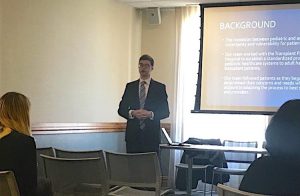By Julia Rist

Kirk Brouwer, FCRH ’20, is researching whether it is possible to streamline the transition for liver transplant patients who are aging out of pediatric care. Brouwer, a psychology major, is working with the Texas Children’s Hospital to develop a faster and more efficient way to help patients who are going through this process.
“This can be a difficult time for patients, so we are looking to make the process as simple and smooth as possible,” Brouwer said. “The first phase of the project was conducting and analyzing pre-transfer interviews to determine how patients felt about the process and what they needed most from their medical team as they changed to new hospitals and providers.”
Brouwer said he would often transcribe the pre-transfer interview, so that he could find any possible correlation between the patients’ experience.
“The pre-transfer interviews were the primary source for data,” said Brouwer. “We analyzed them to find common themes among the patients including their expectations, worries or degrees of anxiety.”
Brouwer works with a team of undergraduate researchers led by Rachel Annunziato, the associate dean for Strategic Initiatives at FCRH. Brouwer said he has been working on this research project since November 2016.
“The Texas Children’s Hospital transition was one of the projects to which I was assigned, and we’ve been working on it on and off since then,” Brouwer said. “Dean Annunziato encouraged me to put a presentation together for the Symposium as we recently completed the first major phase of the study and had implications we could present.”
Annunziato is also an associate professor of psychology at Fordham. She said having Brouwer on their research team has been a big help to her and her entire undergraduate research team.
“Kirk joined my lab when he was a freshman and has been instrumental in coding the interviews we conducted with Texas Children’s Hospital patients about the perceptions of transitioning,” Annunziato said. “We have completed these assessments and are preparing now to disseminate the results. Patients will also be contacted for repeat assessments to learn how the transition has gone for them.”
Brouwer said the only criteria for this research project was that the subjects of the study had to be liver transplant patients who were receiving care from doctors at the Texas Children’s Hospital. This benchmark left room for several variables in the study, including the patients’ day-to-day lives, according to Brouwer.
“The ages ranged from 17-22, so most were in varying degrees of school,” he said. “Some were also going off to college which played a role in the timing of their transition since they wanted to find a hospital convenient to their new schools.”
Brouwer said there were many things he found surprising from his findings, but one especially troubling commonality between the patients was a lack of self-managed care.
“Many of the patients we worked with still relied on parents and healthcare professionals to oversee the daily management of their healthcare needs,” Brouwer said. “This included medication administration, appointment scheduling and lab scheduling. This worried us because typically, in an adult-care unit, although the staff is supportive, patients are expected to be largely self-sufficient.”
Brouwer presented his research at the Fordham Undergraduate Research Symposium on April 11, 2018. He said it was a wonderful experience for him to engage with the audience and also to raise awareness about the needs of pediatric patients.
“Many of the audience members were unaware of the anxiety that comes with a transition process such as the one we are studying, and to be able to demonstrate this to them with my talk was enjoyable, and reaffirmed my interest in pursuing a career in medical psychology,” Brouwer said.
Brouwer said the goal of his research was to improve the transition process between the time when the patient moves from pediatric to adult healthcare of the liver transplant department.
“As a team, we hope to eventually develop a streamlined transition process which the Liver Transplant Department, as well as the rest of Texas Children’s Hospital can use to best serve their patients and mitigate the tension that comes along with this process,” he said.
Brouwer and his team implemented a similar program at Mount Sinai Hospital in New York, and it seems to be working well, according to Brouwer. He said he hopes to adapt this program to the different needs of the patient population at Texas Children’s to see similar success.












































































































































































































